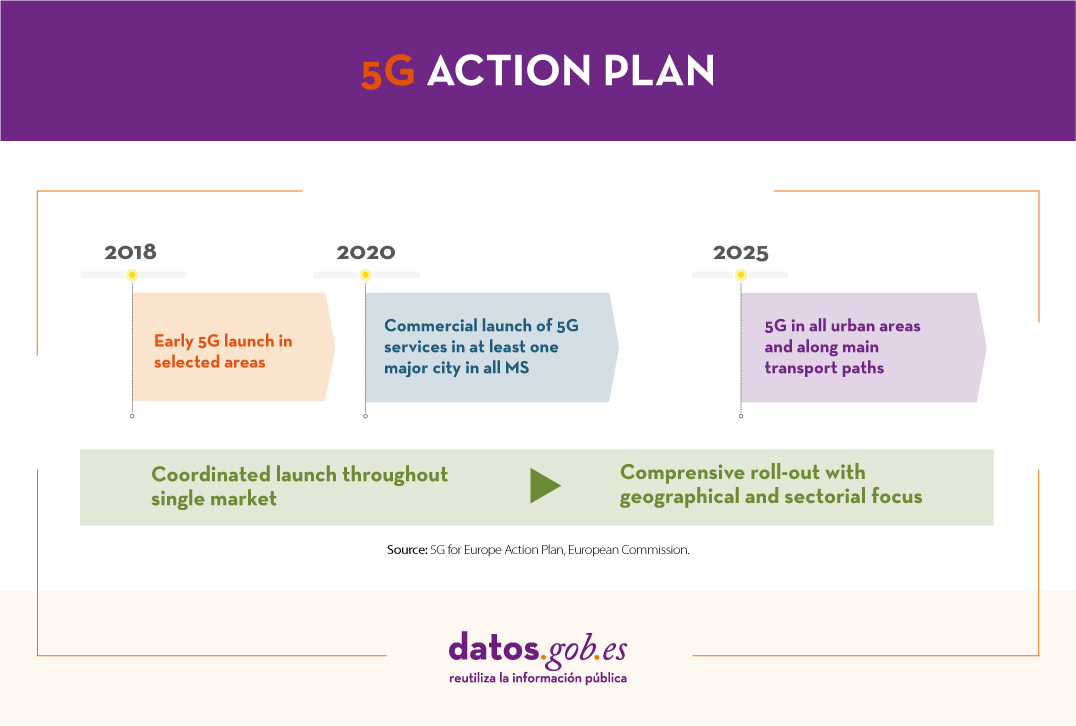
Over the last year we have heard about 5G on numerous occasions, often linked to hoaxes and fake news with no scientific basis that make us forget what is really important: 5G will mean an unprecedented technological revolution that will affect our professional and personal lives, and that will bring about changes in all sectors of activity.
What exactly is 5G?
5G refers to the fifth generation of mobile communication networks. The previous four were characterised by the following functionalities:
- 1G: first mobile phones with talk-only capability.
- 2G: phones incorporate the ability to send SMS.
- 3G: handsets are able to connect to the internet.
- 4G: broadband is developed, capable of assimilating the exponential increase in mobile data consumption, facilitating functionalities such as video streaming and augmented reality.
5G is not entirely new, but an evolution of previous generations that allows for more efficient use of spectrum. 5G technology significantly improves performance in several aspects:
- High density of connected devices: The higher network capacity allows a greater number of devices to be incorporated through simultaneous connections, facilitating, among other things, the mass deployment of sensors and massive machine-to-machine (M2M) communications.
- Faster speed: The speed of 5G is approaching 15 to 20 Gbs per second, which is almost real time. This is expected to further expand the use of virtual desktops or cloud storage. Applications can be accessed and software can be run remotely instantaneously.
- Lower latency: Latency is the time it takes for a data packet to be transferred within the network. That is, the time it takes for an action to be executed from the time we have launched it. With 5G, latency is around 1 millisecond (ms) compared to 20-30 ms for 4G networks.
Benefits that go well beyond the mobile pone
All this not only means improvements for our smartphones, but also a huge employment and economic opportunity. The European Union highlights the impact of 5G in key sectors such as transport, healthcare and industry, with a benefit of more than €500 billion per year worldwide for 5G-enabled service providers.
In the healthcare sector, it will streamline secure online consultations and remote procedures, such as robotic surgery, improving resource efficiency. In transport, it will be a boon for autonomous vehicles: cars will be able to connect with each other (vehicle-to-vehicle or V2V) to share data on routes or their speed, which can be a big improvement in terms of safety. The 5G Automotive Association (5GAA) estimates that, with the advent of this technology, the risk of traffic accidents could be reduced by 65-68%. And in the industrial sector, it will serve to optimise process automation and control of operations by improving the interconnection between the various machines, objects and devices in the production chain.
Its impact on Smart cities and the world of open data
This revolution will also reach Smart Cities. The ability to manage millions of devices in real time will drive the Internet of Things (IoT), with more and more objects becoming connected to each other. By 2025 there will be 55.7 billion connected devices worldwide, 75% of which will be connected to an IoT platform, many linked to smart city environments.
This growing number of interconnected objects, capable of capturing information and talking to each other, will generate an unprecedented volume of data that can be analysed to make informed decisions about what changes or new projects will most benefit citizens.
In addition to 5G, another factor that will facilitate immediacy is edge computing. This technology allows data to be processed and analysed locally, i.e. as close as possible to the sensors that generated the data. This avoids moving all the raw data to central servers, improving efficiency and saving time.
Despite these opportunities, there are still challenges to overcome. Security concerns, cost of implementation or the need for scalable and versatile infrastructures are barriers to overcome to facilitate the expansion of new use cases.
5G in Europe and Spain
The Covid-19 pandemic has demonstrated the importance of resilient, high-speed communications for working remotely, in our daily lives, and for sustaining business operations and processes. This fact, coupled with the advantages and opportunities mentioned above, has led the European Union to include 5G as one of the 7 key areas of the FRR (Recovery and Resilience Facility). It is estimated that a significant part of its planned digital budget of EUR 150 billion will be used to fund 5G network infrastructure. This is coupled with funds from the Connecting Europe Facility and the Digital Europe Programme strategic investments. All of this is part of the 5G Plan for Europe.

In Spain, the promotion of 5G is one of the lines of action of the Digital Spain 2025 Agenda. The 5G technology promotion strategy will have a budget of 300 million euros in 2021. This strategy continues the work started with the National 5G Plan 2018-2020, which has contributed to making Spain the European country with the largest number of cities with available 5G services and pilot projects where possible applications of this technology are being tested. The calls for proposals to promote the development of 5G technology pilot projects, carried out by Red.es, have helped to launch use cases that experiment with virtual reality and augmented reality in Andalusia or promote the supervision of railway infrastructures using drones and industry 4.0 in Galicia. All this has led to the fact that, according to the latest DESI index, Spain is above the EU average in terms of 5G network readiness.
In our country, 5G will make it possible to extend broadband coverage at high speeds in rural and isolated areas, which will help reduce the digital divide and fight depopulation. It will also boost the availability of digital public services.
In short, this is a great opportunity that will accelerate the digital transformation of society and the economy.
Content prepared by the datos.gob.es team.